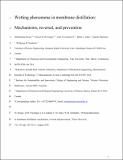Wetting phenomena in membrane distillation: Mechanisms, reversal, and prevention
Author(s)
Rezaei, Mohammad; Warsinger, David M.; Duke, Mikel C.; Matsuura, Takeshi; Samhaber, Wolfgang M.; Lienhard, John H; ... Show more Show less
DownloadREZAEI-Wetting-in-MD_Water-Research-2018-preprint.pdf (6.487Mb)
OPEN_ACCESS_POLICY
Open Access Policy
Creative Commons Attribution-Noncommercial-Share Alike
Terms of use
Metadata
Show full item recordAbstract
Membrane distillation (MD) is a rapidly emerging water treatment technology; however, membrane pore wetting is a primary barrier to widespread industrial use of MD. The primary causes of membrane wetting are exceedance of liquid entry pressure and membrane fouling. Developments in membrane design and the use of pretreatment have provided significant advancement toward wetting prevention in membrane distillation, but further progress is needed. In this study, a broad review is carried out on wetting incidence in membrane distillation processes. Based on this perspective, the study describes the wetting mechanisms, wetting causes, and wetting detection methods, as well as hydrophobicity measurements of MD membranes. This review discusses current understanding and areas for future investigation on the influence of operating conditions, MD configuration, and membrane non-wettability characteristics on wetting phenomena. Additionally, the review highlights mathematical wetting models and several approaches to wetting control, such as membrane fabrication and modification, as well as techniques for membrane restoration in MD. The literature shows that inorganic scaling and organic fouling are the main causes of membrane wetting. The regeneration of wetting MD membranes is found to be challenging and the obtained results are usually not favorable. Several pretreatment processes are found to inhibit membrane wetting by removing the wetting agents from the feed solution. Various advanced membrane designs are considered to bring membrane surface non-wettability to the states of superhydrophobicity and superomniphobicity; however, these methods commonly demand complex fabrication processes or high-specialized equipment. Recharging air in the feed to maintain protective air layers on the membrane surface has proven to be very effective to prevent wetting, but such techniques are immature and in need of significant research on design, optimization, and pilot-scale studies. Keywords: Membrane distillation; Membrane wetting; Hydrophobicity; Pretreatment; Membrane modification; Review
Date issued
2018-03Department
Massachusetts Institute of Technology. Department of Mechanical Engineering; Rohsenow Kendall Heat Transfer Laboratory (Massachusetts Institute of Technology)Journal
Water Research
Publisher
Elsevier
Citation
Rezaei, Mohammad et al. “Wetting Phenomena in Membrane Distillation: Mechanisms, Reversal, and Prevention.” Water Research 139 (August 2018): 329–352 © 2018 Elsevier Ltd
Version: Author's final manuscript
ISSN
0043-1354